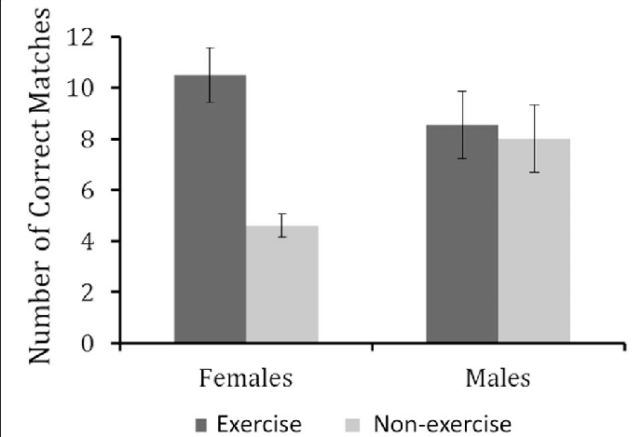Just a few minutes of exercise can have a powerful effect on your brain function, and those benefits for your memory and thinking skills may last longer than scientists thought.
Researchers from University College London and the University of Oxford have now found evidence that the acute cognitive benefits of physical activity do not last just a few minutes or hours, as previous studies suggest, but into the next day.
The ‘micro-longitudinal’ experiment involved 76 British adults, who were cognitively healthy, aged between 50 and 83.
Every day for eight days, the volunteers took a cognitive test that assessed attention, memory, executive functions, processing speed and psychomotor speed, which is the ability to detect and respond to rapid changes in the environment.
During the study, activity levels and sleep were tracked using wearable devices as participants went about their normal lives.
Analyzing the data and taking into account contributing factors, researchers found that test scores for episodic memory and working memory were highest when participants undertook relatively more moderate physical activity the day before, such as a brisk walk or something else that increased heart rate.
Each additional 30 minutes of moderate activity on the previous day was associated with an approximately 0.15 standard deviation increase in episodic memory and working memory scores.
On the other hand, more sedentary behavior the day before had negative associations with working memory.
“These results did not change substantially after taking into account the previous night’s sleep characteristics,” explain the authors, led by epidemiologist Mikaela Bloomberg of University College London.
The team then looked at sleep data on its own, independent of physical activity. They found that longer sleep duration was associated with better episodic memory and psychomotor speed.
In particular, longer periods of slow wave sleep were associated with better episodic memory, including memories of everyday events. While faster eye movement sleep (REM) was linked to better attention scores the next day.
“This was a small study and thus needs to be repeated with a larger sample of participants before we can be confident in the results,” Bloomberg admits.
Currently, there is considerable evidence to suggest that exercise is good for the brain in the short term, but whether or not these benefits last and how long they last is less clear.
Co-author and epidemiologist Andrew Steptoe from UCL says the new study provides evidence that “the immediate cognitive benefits of exercise may last longer than we thought. It also suggests that good sleep quality individually contributes to cognitive performance.”

Exercise is generally believed to increase blood flow to the brain, stimulating the release of neurotransmitters such as endorphins.
A prominent hypothesis is that exercise increases the connectivity of neurons in the hippocampus, a part of the brain associated with memory and learning, and this is what boosts memory function after physical activity.
For example, recently some studies have shown that regular exercise can increase the volume of the hippocampus, potentially slowing cognitive decline.
And earlier this year, a study from Australia found that high-intensity interval training (HIIT), sustained for six months, could even help people maintain their cognitive sharpness for years to come.
Vigorous exercise can have potential harms to human health, and this is not possible for everyone. The fact that even moderate exercise can boost brain function is a positive sign.
It becomes difficult to ignore the fact that a sedentary lifestyle is bad for physical health, and the same can be said for our brain function.
The research was published in the International Journal of Behavioral Nutrition and Physical Activity.



